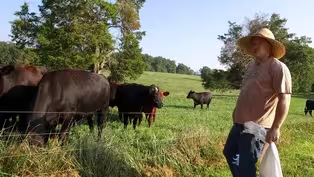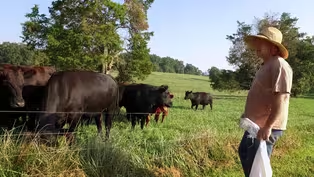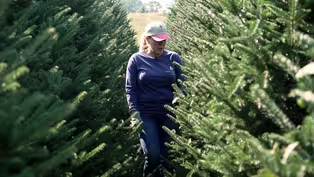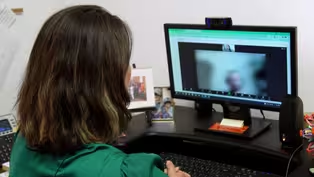
Farmer Mental Health and Suicide Prevention
2/4/2022 | 26m 46sVideo has Closed Captions
Farmers are under increased pressure, which is leading to mental health concerns.
Farmers across North Carolina are facing a crisis of compounding issues that are threatening their mental health and that of their families. In addition to the stress that has accompanied the COVID-19 pandemic, there’s the increased competition from foreign trade because other countries are able to produce crops for much less and the damaging recent international agricultural tariffs.
Problems playing video? | Closed Captioning Feedback
Problems playing video? | Closed Captioning Feedback
ncIMPACT is a local public television program presented by PBS NC

Farmer Mental Health and Suicide Prevention
2/4/2022 | 26m 46sVideo has Closed Captions
Farmers across North Carolina are facing a crisis of compounding issues that are threatening their mental health and that of their families. In addition to the stress that has accompanied the COVID-19 pandemic, there’s the increased competition from foreign trade because other countries are able to produce crops for much less and the damaging recent international agricultural tariffs.
Problems playing video? | Closed Captioning Feedback
How to Watch ncIMPACT
ncIMPACT is available to stream on pbs.org and the free PBS App, available on iPhone, Apple TV, Android TV, Android smartphones, Amazon Fire TV, Amazon Fire Tablet, Roku, Samsung Smart TV, and Vizio.
Providing Support for PBS.org
Learn Moreabout PBS online sponsorship- [Anita] Coming up on ncIMPACT.
- Just reaching a point where I just didn't wanna function in the world.
- [Anita] Many farmers are facing issues, threatening their mental health, but a unique program is now helping them help each other.
This is ncIMPACT.
[bright upbeat music] - [Evan] ncIMPACT is made possible by funding from UNC Health and is a PBS North Carolina Production in association with the University of North Carolina School of Government.
[bright upbeat music] - Hello and welcome to ncIMPACT.
I'm Anita Brown-Graham.
Agriculture is a big part of our state's economy, and we all rely on farmers in many different ways, but farmers face unique challenges related to stress and their mental health.
A recent report from the Centers for Disease Control, shows that farmers are among the most likely to die by suicide when compared with other occupations.
ncIMPACT's, Evan Howell, went to rural Western North Carolina to speak with one man who has seen too many of his fellow farmers struggle in silence.
- Come on, come on, come on!
- [Evan] Luke Beam is a farmer who says the job is mostly about working alone, but says that kind of isolation can have an impact sometimes.
- You just get to talking to yourself and sometimes those conversations don't go well.
Just enough that they like it.
- [Evan] Beam says he's suffered from anxiety and depression before, but he came to a herd one day while he was walking to Corolla calf that had wandered away from the herd.
- I don't ride horses but if I was a cowboy, I'd have been cutting back and forth.
So I was cutting back and forth with the full wheeler and she stopped and I ran into her.
And when I did, I broke her leg.
We sail half cows, quarter cow.
- [Evan] He says the accident was a last straw and put them in a place he didn't wanna be.
- Maybe I was just overworked, or maybe I had things on my mind, or maybe it was guilt about the cow.
Maybe it was all of the above, but I'm just reaching a point where I just didn't wanna function in the world.
[bucket tapping] - [Evan] He says, times got rougher when the pandemic hit, as the supply chain shut down and revenues sank.
He says he and many other farmers he knew were unsure if they could recover.
- You improvise, you found a way to make do you, you borrow someone else's equipment maybe, and farmers are really good about sharing and working together.
- [Evan] Farmers are not exactly the types of people who freely talk about their feelings, but the stresses of the job may be taking a toll on their mental health.
In fact, suicide rates among farmers in the United States increased by 40% in less than 20 years.
- Is in another pasture here.
- [Evan] Beam decided to answer the call and got involved with a farmer mentorship program.
The program is designed to connect farmers with each other.
He says his faith and helping others helps him heal in the end.
- That's a key.
To battle mental illnesses is finding those places of joy.
- [Evan] Beam is hopeful these types of programs will enhance grassroots community support [car engine roaring] and that sewing it all together, will reap rewards for everyone.
For ncIMPACT's, I'm Evan Howell.
[car engine roaring] - Joining me now is James Davis.
Mr. Davis comes from three generations of farmers in Halifax County, and he now serves as the head of programs in North Carolina for the USDA, that is the US Department of Agriculture.
James, what are some of the unique factors about farming that causes it to be so stressful?
- Yes, thank you for having me.
Three things that I kinda look at is number one, financing, marketing, and farmworking, farm labor.
All three are interchangeable.
You can't really have one without the other, but I think starting with financing helps you look at to different things that you're gonna market your crops to.
It's also providing a safety net for your farmworkers and an opportunity for them to make a living.
- So we saw that suicide rates have been going up since 2000, but what is it about the pandemic that has made matters worse for farmers?
- Well, one thing with the pandemic that caused farmers to lose their markets, and by them losing their market, they were losing their livelihoods.
And that created a lot of stress on them.
But with USDA Farm Service Agency, we came out in the only without all, already the safety net programs and disaster programs we had, we came out with pandemic-assistance programs to help farmers and ranchers get through this.
- A little bit more about the kind of federal support that's available for farmers who find themselves in financial distress.
- Well, a lot of these programs, not only that we have loans that are able to assist the farmers, but also we had farmers help them, whether they're organic producers, whether they are livestock producers or general row crop producers.
And with this particular pandemic-assistance programs, we actually opened the doors that maybe farmers that had never come into our offices before and we help them reach the avenue to bridge that gap between the markets that they were losing.
- Let me ask you this, James, in your experience, do you find that farmers are open to talking about some of the mental health challenges that can be caused by this financial distress?
- That's one thing that USDA has strived to do is by starting a farmer and rancher stress-assistant network which is a collaboration, not only with USDA agencies, but with state and local agencies and also universities to help bridge the gap and open up different avenues that farmers to communicate better with us.
In general, we've always been an intake agency that came in and talked with us, but we also too, in our local offices make sure that we communicate with the producers and ask them about different things that's going on to open up that gate for them.
- Thank you, James.
We're lucky to have you where you are in North Carolina.
A program that originated at ECU is helping farmers navigate mental health concerns.
ncIMPACT's, David Hurst, joins us to tell us about the work of the North Carolina Agromedicine Institute.
David how's this organization helping support the mental health of farmers?
- Anita, the North Carolina Agromedicine Institute is based at east Carolina University.
And they've spent decades promoting the health and safety of farmers and their families.
With all that's going on in the world, the institute recognized a big need to provide mental health services for farmers.
So they started a statewide peer support program.
It's called Farmer-to-Farmer.
They've seen success, connecting farmers with other farmers who've received behavioral and mental health training.
- Frazier for tabletop Christmas trees that we will harvest this year.
- [David] Carrie McClain started working for the family farm as a second career.
She quickly realized there was a lot of stress associated with running her family's Christmas tree farm.
- And most of my friends were in white collar jobs.
And so when all of a sudden I came to the farm, there wasn't anybody that I could talk to about the experiences that I was having.
So wait, you're spreading these out.
- [David] Over time, after meeting with other farmers, McClain realized this stress was common working in agriculture, and simply talking about it seemed to help.
- I think we're having stressful experiences, just knowing that having somebody validate that, yes, it is stressful, but then also having somebody validate, yes, that is a normal experience.
I think that right there just relieves a lot of stress.
These trees have been tagged for harvest.
- [David] McClain is now a mentor farmer for the Farmer-to-Farmer program run by the North Carolina Agromedicine Institute.
It's a program that pairs farmers who want to speak with someone to peer farmers who have received special training.
The program began as a way to help farmers navigate the additional stress and anxiety felt as a result of the COVID-19 pandemic.
- It makes it very, very difficult when you're spending all that time alone already.
And then the outlets they had like cooperative extension, farm bureau or commodity meetings, those all became virtual.
So what little socialization they had was suddenly gone.
- [David] The program is free to farmers, and the mentor farmer is able to refer their farmer to professional health services if needed.
- We have to be able to bring in a new generation of farmers if we're gonna continue to feed our nation and quite frankly, the world.
So every time that we're able to keep a farmer successfully farming and that we don't lose a farmer because they've completed suicide, that's a win.
- Carrie McClain says the program has been successful because farmers often prefer to talk to other farmers about what they're going through.
- We all struggle with things that is helpful to talk through.
And sometimes it can be helpful to talk to a friend or a family member, but sometimes you really need to talk to somebody who's kind of been in your shoes.
He really understands what it is that you're dealing with.
And I think that's what peer support programs offer.
- The institute partnered with the UNC Gillings School of Public Health to develop the training and format of the Farmer-to-Farmer program.
Their goal is to have trained peer farmers in every county and Anita, they're also working to make sure this program serves all farmers of all different types.
- Farmers, helping farmers, thank you, David.
Joining us now is Dr. Madeline Moore.
Dr. Moore is the medical director for the North Carolina Farmworker Health Program.
Dr. Moore, we just heard about a peer-to-peer program involving farmers, give us some insights into what makes these kinds of programs work.
- Thank you, Anita.
So the program of where we have community members really reaching out in the field work so well because a lot of the things can be identified right there where things are happening.
And sometimes we're not able to see those in the clinic setting, and so we really rely on our health outreach workers, our peer-to-peer programs, and really connect with farmers and farmworkers where they are.
- It's exciting to hear about all these programs.
Tell us a bit about the North Carolina Farmworker Health Program and its particular role in helping farmers and farmworkers with their mental health.
- The Farmworker Health Program is fantastic.
It covers the entire state.
And what we do specifically for mental health, is we're able to do health assessments in the field and really use that information to identify what needs are available in the state, and then can be delivered to our farmworking community.
The program reaches eight different sites across the state.
And we are seen as almost a health center that provides mental health service, but then also comprehensive primary care.
- Lovely, so hearing this, viewers might think we've got this all solved, what works still needs to be done?
- We really still need to expand our outreach capacity.
Our outreach workers are going to farms and identifying need, and they also are experiencing significant stress.
So support for both farmworkers, and then also our group of outreach workers supporting our farmworkers really needs to be explored.
- And what's the prospect of this kind of expansion of the program?
Do you expect to see that happening soon?
- I'm excited that one of the things that has come out of the pandemic, is we've all started to work together, collaboration has really been important.
And so I think there has been a vision from a state and a national and global perspective that this needs to be prioritized.
- That's lovely.
What advice would you give to a local community that's trying to figure out, "What do we do about the farmers around us?
"How do we get them connected to these kinds of programs?"
- I think each community, and especially within the health municipals, it should really kind of understand what is their capacity and then help us understand how can we build that?
And a lot of that is done through focus groups in the community, a lot of that is doing really productive conversation so we can help to expand those programs.
- Thank you so much, Dr. Moore.
- Thank you.
- Some rural communities may lack the resources needed to provide mental health support for their farmworkers, but ncIMPACT's, Melody Hunter-Pillion, introduces us to a program connecting rural farmworkers to exactly the help they need.
Melody joins us here in studio.
What did you learn?
- Well, it's calling from so an out of the box thinking and Anita, in Sampson County, the Episcopal Farmworker Ministry has gotten creative in order to help migrant farmworkers who are experiencing high levels of stress and also depression.
The program lets people know they're not alone, it's okay to talk to someone and you can do it virtually.
[speaking in foreign language] - [Melody] Mary Johnson Rockers is the teletherapy program lead at El Futuro in Durham.
With the help of three grants, she connects therapists to farmworkers in rural counties.
- I like to think that by seeing someone like me or one of my colleagues, by seeing an outreach worker who cares about them, it helps them feel a little less alone in carrying that weight and that struggle.
[speaking in foreign language] - [Melody] Maria Lemus used to work on a farm in Sampson County and attended individual and group tele therapy sessions.
[speaking in foreign language] - [Translator] Honestly, I think that we just don't ask for help.
[speaking in foreign language] But in reality, I think that most of us need it.
- [Melody] Before assisting at Episcopal Farmworker Ministry, she worked at bell pepper crops in Pennsylvania and tobacco in North Carolina.
Working and raising her children while separated from her husband, Lemus shoulder more than she realized.
[speaking in foreign language] - [Translator] I used to feel sad and angry and it was a lot of different feelings that I don't even know how to explain.
- [Melody] Virtual therapy visits use the same privacy and confidentiality standards as in-person therapy sessions.
And virtual has its own benefits.
- Especially if someone doesn't have transportation or if there are other barriers to getting to a clinic or to getting this far to Durham.
- [Melody] Migrant workers on contract in North Carolina might live apart from their families for six or more months out of the year.
- Not being with family for that amount of time can really cause concern and anxiety about their family back home, especially with COVID this past year, effecting Latin American-Mexico and in devastating ways.
- [Melody] And then there's the weather and other storms.
- Hurricane Florence did a lot of damage in Eastern North Carolina.
And we were working mainly with undocumented families and farmworker families at the time, not long ago, there had been immigration rates also here in North Carolina.
So everybody was already stressed out and then when the hurricane took place, it was even worse.
- [Melody] Lemus believes the teletherapy can help other agricultural workers in rural communities 'cause it helped her.
[speaking in foreign language] - [Translator] Yes, I felt that peace, I've also felt a calm, happy, and with a clear vision of my life.
- This partnership allows organizations like the Episcopal Farmworker Ministry to provide those critical services for free and in Spanish.
Those are two key elements, just as important building trust and dispelling stigmas about mental health.
So Anita, we all get stressed and we all need some way to work it out and working through it.
- Absolutely, thank you so much, Melody.
- My pleasure.
- Let's bring back our wonderful panelists.
And also joining us for our ncIMPACT round table is Rich Bonanno, the director of the North Carolina State Corporative Extension.
Rich, let's start with you.
Share for the audience a little bit more about some of the unique mental health challenges for migrant farmers in particular.
- Well, thanks Anita, for having me today.
In a non COVID situation, there's stresses that just follow farmworkers, travel, being away from their families for long periods of time, worrying about their families while they're separated from them.
But COVID has brought a whole new set of circumstances that involved, whether or not they could get their visas to travel, worrying about the health while they're traveling, oftentimes on farm, they're living in congregate housing.
So they're living together, they're eating together, they're working together.
And as a result, they've been very worried about whether or not they would stay safe, because if they can't work and they get sick, then they don't have the income that they and their families rely upon.
- Thank you, James, we saw in the last video, the promise of teletherapy, did you see that as an answer for rural communities that lack mental health support resources?
- Yes, I think that's going to be very important in the incoming future and right now, because number one, we are at a time when everybody's dealing with a lot of COVID protocols, and we're doing a lot of virtual things, whether it's by computer or over the phone.
So it's definitely gonna be important, because as the way we once did things, we don't see that anymore.
And coming in with, while we having a presence in every county, in the state of North Carolina, we find it more important now, as we don't have farmers and ranchers coming into the office, as they once did, now, we find it even more anticipated that we're gonna be having more phone calls, more emails, more virtual meetings, and that's going to be very important to make sure the livelihood of farmers and ranchers exists in North Carolina and throughout the nation.
- So we'll be using virtual platforms for everything, including helping people with their stress and their mental health issues.
We also saw in that last story, a strong partnership between a nonprofit in an urban area, Durham, and a rural non-profit in Sampson County.
What are some of the ways communities can bring about these kinds of collaborations, Dr. Moore?
- So, yes, we especially love our collaboration with El Futuro with North Carolina Farmworker Health Program.
I think it's important to identify the needs and then search out the appropriate services and that collaboration, especially using virtual care has just been very important.
And I think we have a lot of things to do to make that program grow.
- So I'm curious what other statewide initiatives or local solutions are you seeing success in in terms of getting farmers and farmworkers the help they need, and I'll start with you Rich, but I'd be happy to have anybody else jump in to answer this question too.
- Well, so within cooperative extension, and also our partnership with the North Carolina Agrimedicine Institute, which is a collaboration between ECU, NC State University and NCA&T State University, we've taken it upon ourselves to train our people that are also located in every county plus the Cherokee nation in North Carolina to help recognize when farmers are under stress.
Farmers tend to want to deal with people they trust.
And we find that people that they see on a regular basis, including extension employees, are people that they do trust and are willing to talk to them.
But also the peer-to-peer Farmer-to-Farmer Cooperation has been absolutely wonderful.
And the Agromedicine Institute beyond that also provides one-on-one counseling for farmers as well.
So all of these things coming into play have really helped farmers that are willing to seek some help, get some well-deserved help and some ability to be able to slow down and reflect and maybe regroup and set their mind at ease with some of the stresses that have been on them over the past several months.
- Thank you.
Anybody else wanna jump in on things that we haven't discussed that are happening, that are promising?
- I have one comment.
We've been working with the farmworker program to develop internet connectivity 'cause when we're talking about rural areas amongst the state, a lot of times we do have to bring hotspots with us if we're doing mobile clinics and make sure that we have the appropriate reception to connect with farmers and farmworkers.
So that's another thing that's kind of continuing to grow.
- That's really helpful because, obviously, the success of tele-health depends in large part on whether people have access to high-speed internet, yeah.
This is a hard question, but I have to ask it.
And I'll start with you, James, but again, others, please feel free to jump in.
Let's talk a little bit about what's at stake if we don't make supporting mental health for farmers a priority?
- That's a great question, Anita.
One thing that we actually see across the state and across the country, number one, the livelihood of farmers are definitely at stake anyway, because of dealing with different marketers, the highs and lows of market prices.
And now on top of that having COVID issues.
So now at this time, we at a very critical point that we can make sure that farmers can bridge that gap to get the opportunities that they need, not only, well, it was financial literacy, marketing information, making sure they communicate with their farmworkers day-to-day about what's going on.
I think the avenue of just opening up, communication is going to be the key, not only through all my sister agencies with NRCS, the Risk Management Service in the United States Department of Agriculture, but the line of communication with state and local leaders, we all have to work together to make sure that farmers and ranchers stay in existence, not only in the state, but in the nation.
- Rich's thoughts about what's at stake?
- Well, we certainly need food and we have a limited number of farmers farming on less land.
Every time the population grows.
We know we have an expanding population and we need to make sure we have a reliable food supply.
The types of shortages that we saw early on in the pandemic are things that really got people's attention when it came to their supply of food and we need to make sure that our farmers have the resources, the tools, the help they need to remain productive and produce the food that we need for a growing population.
- Doctor Moore.
- And I think just to minimize suffering amongst the community because I'm untreated anxiety and depression is just such a horrible thing to have to deal with, especially when you're feeling alone.
- James, I'm gonna let you have the last word.
What advice would you as a third generation farming family give to a young person who's considering going into farming?
- Well, the one advice that I would give is just make sure that what you going in to have that diversification angle in there.
Don't just look at one aspect of farming.
Right now, you have to be diversified enough to actually make ends meet.
You need to make sure you make all... Connect all the dots with all of your financial opportunities, all your marketing opportunities, and everything, makes sure you build those relationships, not only on the state level, but on your local level, make sure you are aware of every opportunity that you have to assist you in things that you need to do to be successful, and be encouraged.
I mean, be encouraged because we have assistance out there for you, please come by our local offices to see you.
We'll be glad to help you in any way we can.
- Be encouraged indeed.
Thank you all for joining us and thank you for the work that you do on this very important topic.
And thank you for watching and engaging.
Solutions are out there if we work together.
Tell us what your community is doing or how we can help you.
Email us at ncimpact@unc.edu or message us on Twitter or Facebook, and be sure to join us every Friday night at 7:30 on PBS, North Carolina for new episodes of ncIMPACT.
Coming up on ncIMPACT.
- And right now the grade levels are so low.
Our kids are a year behind.
- [Anita] COVID-19, school closings, and distance learning have led to significant learning loss for some students.
How communities are helping those students get back on track.
[bright upbeat music] - [Evan] ncIMPACT is made possible by funding from UNC Health and is a PBS, North Carolina Production in association with the University of North Carolina School of Government.
[bright upbeat music]
Preview | Farmer Mental Health and Suicide Prevention
Preview: 2/4/2022 | 20s | Farmers are under increased pressure, which is leading to mental health concerns. (20s)
Farmer shares his mental health struggles
Video has Closed Captions
Clip: 2/1/2022 | 2m 14s | NC farmer helps others with mental health issues by sharing his story. (2m 14s)
Peer support program focuses on farmer mental health
Video has Closed Captions
Clip: 2/1/2022 | 2m 34s | A program is connecting farmers with resources to help with mental health challenges. (2m 34s)
Providing mental health support to rural farmworkers
Video has Closed Captions
Clip: 2/1/2022 | 2m 59s | A partnership is focusing on providing mental health support to rural farmworkers. (2m 59s)
Providing Support for PBS.org
Learn Moreabout PBS online sponsorship
- News and Public Affairs

Top journalists deliver compelling original analysis of the hour's headlines.

- News and Public Affairs

FRONTLINE is investigative journalism that questions, explains and changes our world.












Support for PBS provided by:
ncIMPACT is a local public television program presented by PBS NC



